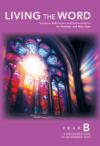Scripture Study for
Ascension of The Lord
Acts 1:1–11 / Psalm 47:6 / Ephesians 1:17–23 or Hebrews 9:24–28; 10:19–23 / Luke 24:46–53
<< Back to LECTIONARY RESOURCES
Understanding the Word
By Br. John R. Barker, OFM
The ascension of Jesus to the Father takes place forty days after his resurrection. Forty days is, of course, a common time frame in the Bible, often signifying a complete time of “training” in the ways of God (think of Moses on top of Mt. Sinai, Elijah at Horeb, or even Jesus in the wilderness). Having taught his apostles for forty days, Jesus departs from them, leaving them the task of carrying on his work (as Moses, Elijah, and Jesus had done God’s work before). The apostles, despite their instruction, are still not clear on at least one point and wonder if now is the time when God will reestablish the temporal kingdom of Israel. Jesus corrects them by emphasizing that God’s reign will be reestablished through their preaching “to the ends of the earth” until he returns again.
A central point of the letter to the Hebrews is that Christ, as the great High Priest, has rendered former temple sacrifice unnecessary. Whereas the earthly high priest entered into the earthly sanctuary to offer sacrifice, Christ has entered into the true, heavenly sanctuary to “appear to God on our behalf.” This is not an appearance that takes place regularly, as on earth, but continually, as he now resides in that sanctuary. In the end, Christ will bring his faithful into the sanctuary with him. Those faithful have no fear of approaching God through Christ, as long as they do so “with a sincere heart and in absolute trust,” purified by Christ from sin and its effects.
In his final appearance before his ascension, Jesus instructs his disciples about the scriptural testimony to him, as he had for the disciples on the road to Emmaus (Luke 24:27). The suffering and death of Jesus were not accidents but part of a mysterious divine plan. Also part of that plan is the preaching of repentance for the forgiveness of sins to all the nations, the task now being handed on to the disciples. To do that, they will be “clothed with power from on high” by the Holy Spirit, “the promise of my Father.” They are not to do anything until that time, lest they attempt to act under their own power and inspiration rather than God’s. With this instruction Jesus departs, leaving the startled but overjoyed disciples to return to Jerusalem to await the Spirit.
